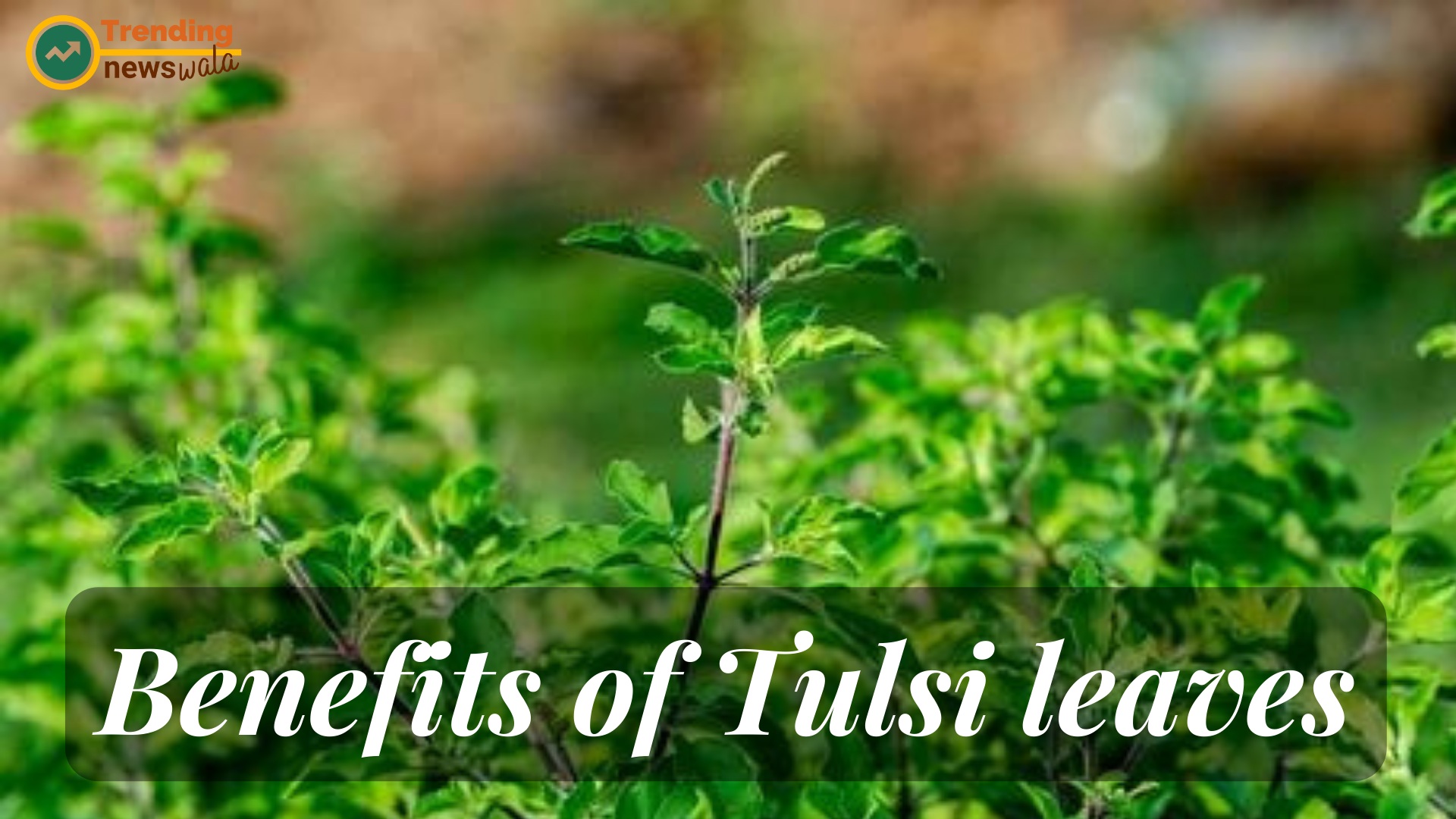10 Benefits of Tulsi leaves

Tulsi leaves, also known as Holy Basil, are the leaves of the Tulsi plant (Ocimum tenuiflorum). The plant is native to India and is considered a sacred herb in Hinduism. The leaves of the Tulsi plant are highly aromatic and have a slightly bitter, pungent taste. They are often used in traditional Ayurvedic medicine and in culinary preparations in India.
Tulsi leaves are rich in antioxidants and have many health benefits, including boosting immunity, reducing stress, and improving respiratory health. They can be consumed in various forms, such as fresh leaves, dried leaves, or as a tea. In Indian households, tulsi leaves are often used to make tea or added to curries and soups for their unique flavor and health benefits. They are also used in many herbal supplements and natural remedies.
Unique health benefits of Tulsi
Tulsi, also known as Holy Basil, is an herb that has been used for its medicinal properties for centuries. It is a sacred plant in Hinduism and is known for its aromatic leaves and unique flavor. Here are some of the unique health benefits of Tulsi:
1. Boosts Immunity: Tulsi is rich in antioxidants and has immune-modulating properties that help to boost the immune system. It also contains compounds that have anti-inflammatory and antimicrobial properties that can help fight off infections.
2. Reduces Stress: Tulsi has adaptogenic properties that help to reduce stress and anxiety. It helps to balance the hormones in the body and can also improve cognitive function.
3. Lowers Blood Sugar: Tulsi has hypoglycemic properties that help to lower blood sugar levels. It can also improve insulin sensitivity, making it a useful herb for people with diabetes.
4. Protects the Heart: Tulsi has cardioprotective properties that can help to protect the heart. It can lower cholesterol levels, reduce blood pressure, and prevent blood clots.
5. Relieves Respiratory Disorders: Tulsi is an effective remedy for respiratory disorders such as asthma, bronchitis, and coughs. It helps to clear the respiratory tract, relieve congestion, and improve breathing.
6. Supports Digestive Health: Tulsi has digestive properties that can help to relieve digestive issues such as bloating, constipation, and indigestion. It can also help to improve the health of the gut microbiome.
7. Improves Skin Health: Tulsi has anti-inflammatory and antioxidant properties that can help to improve skin health. It can reduce inflammation, prevent acne, and improve the overall appearance of the skin.
Overall, Tulsi is a powerful herb that can provide a wide range of health benefits. It can be consumed in various forms such as tea, capsules, or fresh leaves. However, it is always recommended to consult a healthcare professional before using Tulsi for medicinal purposes.
Nutritional values of tulsi Leaves
Tulsi leaves, also known as Holy Basil, are a rich source of nutrients and have several health benefits. Here are the nutritional values of Tulsi leaves per 100 grams:
- Calories: 23
- Carbohydrates: 4 grams
- Protein: 3 grams
- Fiber: 1 gram
- Fat: 0.6 grams
- Vitamin A: 566 IU
- Vitamin C: 18 milligrams
- Calcium: 177 milligrams
- Iron: 3.2 milligrams
- Magnesium: 64 milligrams
- Potassium: 295 milligrams
Tulsi leaves are also rich in antioxidants, flavonoids, and essential oils, which contribute to its health benefits. The antioxidants in Tulsi leaves help to neutralize free radicals in the body, which can damage cells and lead to various diseases. The essential oils in Tulsi leaves have anti-inflammatory, antimicrobial, and analgesic properties, which can help to relieve pain, reduce inflammation, and fight infections.
Side effects of tulsi Leaves
Tulsi, also known as Holy Basil, is generally considered safe when consumed in moderation. However, some people may experience side effects from consuming Tulsi leaves. Here are some potential side effects of Tulsi leaves:
1. Blood Thinning: Tulsi leaves have natural blood-thinning properties, which can interfere with blood clotting. People who are taking blood-thinning medications or have bleeding disorders should avoid consuming large amounts of Tulsi leaves.
2. Hypoglycemia: Tulsi leaves have hypoglycemic properties, which means they can lower blood sugar levels. People who are taking medications for diabetes should monitor their blood sugar levels closely when consuming Tulsi leaves.
3. Pregnancy and Breastfeeding: Pregnant and breastfeeding women should avoid consuming Tulsi leaves in large amounts, as it may have a uterine-stimulating effect and cause contractions.
4. Allergic Reactions: Some people may be allergic to Tulsi leaves and may experience allergic reactions such as itching, swelling, and difficulty breathing.
5. Interactions with Medications: Tulsi leaves may interact with certain medications, including blood pressure medications, diabetes medications, and anticoagulants. People taking these medications should consult with a healthcare professional before consuming Tulsi leaves.
Overall, Tulsi leaves are safe for most people when consumed in moderation. However, if you experience any adverse reactions, you should stop consuming Tulsi leaves and seek medical attention if necessary. It is also recommended to consult with a healthcare professional before consuming Tulsi leaves for medicinal purposes.
How to consume Tulsi?
Tulsi, also known as Holy Basil, can be consumed in various forms to obtain its health benefits. Here are some ways to consume Tulsi:
1. Fresh Leaves: You can consume fresh Tulsi leaves by chewing them or adding them to salads, sandwiches, or other dishes. You can also make a paste of Tulsi leaves by grinding them with a little water and use it for various purposes.
2. Tulsi Tea: Tulsi tea is a popular way to consume Tulsi leaves. You can make Tulsi tea by boiling water and adding Tulsi leaves to it. Let it steep for a few minutes, strain the leaves, and enjoy. You can also add other herbs or spices like ginger, honey, or lemon for added flavor and health benefits.
3. Tulsi Capsules or Supplements: Tulsi capsules or supplements are also available in the market, which can be taken as per the recommended dosage.
4. Tulsi Juice: Tulsi juice is also a popular way to consume Tulsi leaves. You can extract the juice from Tulsi leaves by blending them with water and then straining the mixture. Tulsi juice can be consumed alone or added to other juices or smoothies.
It is essential to consume Tulsi in moderation and consult a healthcare professional before consuming it for medicinal purposes, especially if you have any underlying health conditions or are taking any medications.
FAQ for Benefits of Tulsi leaves
Q: What are the benefits of consuming Tulsi leaves?
A: Tulsi leaves have several health benefits, including boosting immunity, reducing stress, improving respiratory health, promoting digestion, and improving skin health.
Q: Can Tulsi leaves help with respiratory problems?
A: Yes, Tulsi leaves have expectorant and anti-inflammatory properties that can help to relieve cough, cold, and other respiratory problems.
Q: How does Tulsi leaves help in reducing stress?
A: Tulsi leaves have adaptogenic properties that can help to reduce stress and anxiety by promoting relaxation and calming the mind.
Q: Can Tulsi leaves help with digestion?
A: Yes, Tulsi leaves have carminative and anti-flatulent properties that can help to promote digestion, relieve constipation, and reduce bloating.
Q: How does Tulsi leaves help in boosting immunity?
A: Tulsi leaves have immunomodulatory properties that can help to boost the immune system and protect the body against infections and diseases.
Q: Are there any side effects of consuming Tulsi leaves?
A: Tulsi leaves are generally safe when consumed in moderation. However, some people may experience side effects such as hypoglycemia, blood thinning, allergic reactions, and interactions with medications. It is recommended to consult with a healthcare professional before consuming Tulsi leaves for medicinal purposes.
Q: Can pregnant women consume Tulsi leaves?
A: Pregnant and breastfeeding women should avoid consuming Tulsi leaves in large amounts, as it may have a uterine-stimulating effect and cause contractions. It is recommended to consult with a healthcare professional before consuming Tulsi leaves during pregnancy and breastfeeding.
Q: How much Tulsi should one consume per day?
A: The recommended dosage of Tulsi leaves varies depending on the form and purpose of consumption. As a general guideline, 2-3 Tulsi leaves or 1-2 cups of Tulsi tea per day is considered safe for most people. However, it is recommended to consult with a healthcare professional before consuming Tulsi leaves for medicinal purposes.





